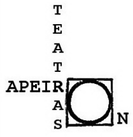|
Apeirono teatras – profesionalus teatras, kurį 2012 m. savo iniciatyva įkūrė režisierės Eglė Kazickaitė ir Greta Gudelytė.
Sunkiai suvokiama apeirono sąvoka daugeliui gali tapti raktu į Apeirono teatro spektaklių pasaulį, talpinantį savyje postdraminio, siurrealistinio, absurdo, socialinio grotesko ir kitų teatrinių stilių elementus, atveriantį platų interpretacijos lauką (intertekstuali dramaturgija praktiškai nenustato suvokimo ribų). Apeironas - tai neapibrėžta beribė būtis. Pasak graikų filosofo Anaksimandro, apeironas yra amžinas, viską apimantis ir viską valdantis, neturintis pradžios ir pabaigos pradas, kuris pats nekinta, kinta tik jo formos. Apeirono teatre vengiama vienprasmiškumo, laiko ir veiksmo nuoseklumo, daug kontekstų, sąsajų su filosofinėmis koncepcijomis, poezija, bet visada suteikiamas prioritetas minčiai. Labai svarbus vaidmuo tenka ir žiūrovams - publika Apeirono teatre suprantama kaip spektaklio bendraautorė, nebijantį savaip pamatyti, interpretuoti, suprasti spektaklį. Apeirono teatro kūrėjai, analizuodami visuomenę psichologiniu, sociologiniu aspektu; stebėdami žiūrovo reakcijas, vyraujančias teatrines formas ir jų variacijų galimybes, ekperimentuodami su kalba ir dramaturgijos teatrine raiška, plėtoja diskursyvinio teatro įdėją. Per trumpą gyvavimo laiką Apeirono teatras spėjo tapti vienu labiausiai intriguojančių teatrų Lietuvoje. Provokuojantis, eksperimentuojantis, laužantis ribas, veržlus, nepatogus, chaotiškas, iracionalus, amorfiškas – apibūdinant Apeirono teatrą naudojami įvairūs epitetai. Akivaizdu, kad teatro mėgėjai ir kritikai nesutaria, kas yra ir koks yra Apeirono teatras – „ambivalentiškas, savo teatro kalbos, savo žiūrovo ieškantis teatras“ (Andrius Jevsejevas) ar „grafomaniška pretenzija į postpostmodernų teatrą“ (Simonas Norbutas). Apeirono teatro kūrėjai nesistengia įtikti ir patikti kurios nors konrečios teatrinės koncepcijos, teorijos, ideologijos šalininkams, nesiekia tapti „teisingu“ teatru. Specifinę dramaturgiją ir vizualinę bei garsinę raišką naudojantis / kuriantis Apeirono teatras nesitapatina su „nueinančia“ XX a. teatrine tradicija ir atšiaurioje, nepatikliai į ateinančius žvelgiančioje kasdienybėje kuria savojo teatro viziją. Vertical Divider
|
Apeiron Theater is a professional theatre founded in 2012 by two young directors Eglė Kazickaitė and Greta Gudelytė.
The concept of “apeiron” although difficult to understand, can, for many, become the key point entering the world of Apeiron's theatrical performances. These performances include elements of post-dramatic, surreal, absurd, social grotesque, other theatrical styles and open up a wide field of interpretations (as intertextual dramaturgy practically does not set any boundaries for perception). Apeiron is an indefinite limitless being. According to the Greek philosopher Anaksimander, the apeiron is an eternal, all-encompassing, all-controlling origin that has no beginning and is endless, which itself does not change, only its forms varies. The Apeiron Theater avoids monotony, consistency of time and action, too many contexts, links with philosophical concepts, poetry, but always gives priority to thought. The audience plays very important role and is understood as the co-author of the performance, which is also encouraged to see, interpret or understand the performance in its own way. Creators of the Apeiron Theater analyzing society in psychological, sociological aspects, observing the reactions of the spectator, the prevailing theatrical forms and the possibilities of their variations, experimenting with the language and the theatrical expression of dramaturgy, develop the idea of discursive theater. During a short lifetime, Apeiron Theater became one of the most intriguing theaters in Lithuania. “Provocative“, ”experimenting“, “boundary-breaking“, “brutal“, “uncomfortable“, “chaotic“, “irrational“, “amorphous“ – different epithets are used to describe the Apeiron Theater. Theater lovers and critics do not agree on what the Apeiron Theater is: "ambivalent, its theater language, its spectator-looking theater" (Andrius Jevsejevas), or "graphomania claim to post-modern theater" (Simonas Norbutas). The creators of the Apeiron Theater do not try to please the proponents of the particular theatrical conception, theory or ideology of any particular concept, nor seek to become a "true" theater. They use specific dramaturgy, visual and acoustic expression, do not identify with the theatrical tradition of "passing" 20th century and create their own vision of theater instead. |

